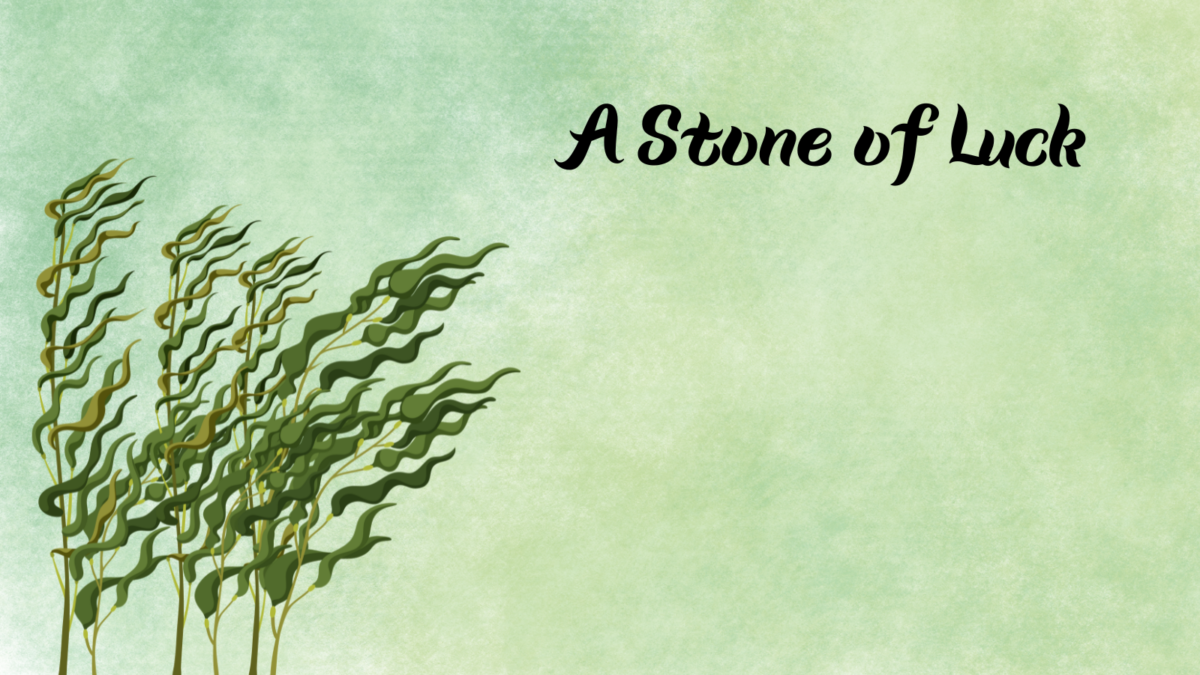Written collaboratively at Gen Con 2024 in 40 minutes by Aubrey Dee Sweeney, Mary Emma Heaps, I like birds, Orchid Lily, Amanda Lynne, Kathy L. Brown, Jim Knipp, Zak Federer, and RJ McGuire. Edited by E.D.E. Bell.
Cicada sat on the old castle wall, staring down at the moat below. His parents, who had left the world of science to open a traveler’s pub in this old, abandoned castle, had told him he could never go in the moat, not even listening when he’d tried to tell them of his stone.
They had bought him more paints, delicate brushes, to decorate others rocks. He wanted his rock.
“You must not go in the moat,” they’d repeated.
But they had never told him why.
Aunt Plural, she had told him. It sounded unreal, like a story told to little children. Cicada was eight now, too old for magical tales. Yet Aunt Plural had always been someone he could trust. So. He wondered.
“They don’t want you disturbing the sea folk,” she’d said. “Tiny, tiny, merfolk, that crawl on the skin. Bad luck to disturb them.”
But Aunt Plural didn’t understand. The last time they’d crossed the moat after a trip to the village, Cicada had been so entranced by the waves, wondering if there really was a King’s treasure beneath them, that his grip on his lucky stone – the one he’d painted with a happy, smiling, seal, had slipped into the water with a soft plunk, immediately lost into the murky green.
His lucky stone was his luck. He only wanted it back.
It began to rain. Perhaps it was a sign. The adults were inside, the tavern busy, they hadn’t seen him slip out. If he waited too long, they would notice. The rain somehow, emboldened him.
He walked to the edge, wondering if somewhere in the moat, tiny, tiny hands played with his painted stone. Did they play? Did they appreciate it? Or did it sink into the muck at the bottom, soon to disappear.
Cicada knew about children’s stories. In fact, now he was wondering if they were stories at all, if Aunt Plural believed in them. Yet in the stories, one always offered trade. Treasure for treasure.
He reached into his pocket. No lucky stone. He did have a piece of candy that Aunt Plural had given him. Perhaps it would do.
It was very good candy.
Feeling a bit silly, not entirely convinced he wasn’t following a child’s tale but wanting to believe, he called out toward the moat. “Hello. I’d like to trade for my lucky rock. I have here a piece of very good candy that I can offer you.”
He thought that was how you did it.
Nothing happened. A chill from the rain set on his skin. Just as hope began to leave him, he saw a ripple in the water. The same type of ripple that had caught his eye when he’d dropped the stone.
“Don’t be silly,” a tiny voice said. “That’ll dissolve in the water! But if your rock is precious we can help you find it. Perhaps another rock to trade? A nice round one, rolled by the sands, to play with.”
“We would like the candy,” another voice said, it seemed in disagreement. “If there’s a way to offer it.” He knew the tone of that voice. A voice that loved candy, loved it, like he did. Perhaps, like him, that merperson was not supposed to cross the boundary of air and water, not even to eat the candy.
“I can do both!” he said, feeling sure that he would try in his excitement. He searched, finding a smooth tumbled, rock. And in a moment of inspiration he pulled his paints, and painted the candy on the rock as well, waving it to dry.
He set them both – the rock-shaped candy and the candy-painted rock, just again the edge of the moat. He stepped back. “I will not come closer,” he called. “Here, you can eat the candy now, still at the edge, and also have the rock to enjoy how pretty it is, and think of the memory forever!” He smiled, feeling very proud of this solution.
Surely with a trade like this, the tiny merfolk would return his lucky rock.
Something tickled at his ankles! What was it?
A movement, on his legs, then against his side. Before he could understand, a tiny being had crawled to his face, and pressed a tiny mouth against his. Instantly, a bubble formed. A bubble of breathing! Like in the stories!
And the candy, surrounded by a trio of merfolk, was nearly eaten, and the painted rock being carried into the moat.
“Come in,” they called. “It’s safe to breathe!”
As he lowered himself into the murky water, he heard clearly, “Welcome to our forest.”
A kelp forest! Huge waving stalks of seaweed, tiny merfolk sleeping in its nooks, or climbing between. How could he ever find his lucky rock in all of this?
“This way,” the one who’d made the bubble said. He followed, his body surprisingly light and easy to move in the direction he was pointed. They wound around the bend.
What he saw, was…the treasure. The treasure of the King. A pile of coins of all values, from copper to tin. But around it, wilted kelp, and a few discarded trinkets, that here felt like trash untended.
“The landfolk toss them through the well,” his new friend lamented. “But the copper poisons the life. The fingerprints bring disease. Both create rot. It seeps from here, and what is left livable of our only home grows crowded and more crowded. And we fear for where it may end.”
“Or not end,” a sullen voice called from behind.
The wishing well, he realized. Travelers tossed coins and trinkets, in ratio to their means, for the luck of the moat. The luck, he realized, then, they must believe – of the seafolk.
If he took the treasure, it would help the seafolk. And he would be rich, like the Kings of old! And so, he began stuffing his pockets, every last one, every mended tear, with all the coins he could find. He grew heavy, no longer able to move. His breathing grew difficult, and the bubble around his lips started to shrink.
“We can’t lift you,” they called. He wanted to remove the coins from his pockets, but he was growing dizzy.
This, maybe this, was why his parents warned him away from the moat.
A soft, sleek body pressed against his, and what he knew to be a selkie carried him to land, setting him so, so gently onto the boards of the walk.
“You saved me,” Cicada gasped out, the bubble now entirely gone. “What could I possibly trade for this?”
“All I want,” the selkie said, “is for the landfolk who returned to this castle, where we’d finally been living in peace, to respect our home alongside theirs.” Then, she chuckled. “And perhaps, I’d love a cooked meal for once! I remember the days where every meal did not have to match the temperature of the water. And with the spices of land.” The selkie licked her lips. “But I cannot ask. We will not risk contact. And you, you will keep this secret?” The selkie looked at him with a recognizable face of when a teacher said a thing like it was a thing of fact, but then, repeated to make sure the class understood. Not really a question, but the answer as important.
“Of course, of course.” He sprang to stand. “I will return!”
He realized he should thank the selkie, but he was already running, his feet slipping on the wet ground. He knew the person he needed to find, and he ran toward the castle, barreling forward until he saw his Aunt, pulling on her boots. As if she’d already known he was looking for her.
“Cicada!” She sighed in relief. “I saw you were gone, and I worried that what I’d said… That your parents were right. That you were too…”
“What do I do?” he said, waving his hands and starting right in on the story until it was done.
She tapped her chin. “Making a friend of a selkie is a special thing indeed. You will return to her, and make her this offer. If you agree,” she added, sounding thoughtful. “With her help, we will bring up all the coins. We will keep them secret. With some, we will build a new well, on land, and with the others, we will buy food from the pub, wonderful cooked dishes that the selkie would love. The new wishing well will not travel to the moat, it will land in a bucket we can use to bring the selkie more cooked food, and also to preserve the moat. To help keep it clean. To add nice baubles inside, for shelter and play.
“What do you think?” she asked.
#
“How long did it take to get back your rock?” his nibling asked, bouncing with excitement.
Cicada laughed. “I think they found it right away. But they waited, and gave it to me as a gift, when the last of the metals had been removed.” He turned the painted rock in his hands, the little seal smiling back at him. He had painted many rocks since then, but this, this one was his luck.
“I’m as old as you were, then, Uncle Cicada,” they said. “Do you think I could meet the seafolk? I would help keep the moat clean! And help bring the cooked food, with all the best spices! Could I?”
Cicada smiled.
###

